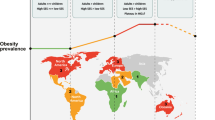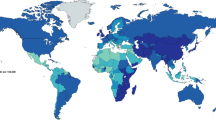Abstract
Heavy alcohol consumption in mid-adulthood is an established risk factor of colorectal cancer (CRC). Alcohol use in early adulthood is common, but its association with subsequent CRC risk remains largely unknown. We prospectively investigated the association of average alcohol intake in early adulthood (age 18–22) with CRC risk later in life among 191,543 participants of the Nurses’ Health Study ([NHS], 1988–2014), NHSII (1989–2015) and Health Professionals Follow-Up Study (1988–2014). Cox proportional hazards models were used to estimate hazard ratios (HRs) with 95% confidence intervals (CIs), which were pooled using random effects models. We documented 2,624 CRC cases. High alcohol consumption in early adulthood (≥ 15 g/day) was associated with a higher CRC risk (multivariable HR 1.28, 95% CI 0.99–1.66, Ptrend = 0.02; Pheterogeneity = 0.44), after adjusting for potential confounding factors in early adulthood. Among never/light smokers in early adulthood, the risk associated with high alcohol consumption in early adulthood was elevated (HR 1.53, 95% CI 1.04–2.24), compared with those who had < 1 g/day of alcohol intake. The suggestive higher CRC risk associated with high alcohol consumption in early adulthood was similar in those who had < 15 g/day (HR 1.35, 95% CI 0.98–1.86) versus ≥ 15 g/day of midlife alcohol intake (HR 1.35, 95% CI 0.89–2.05), compared with nondrinkers in both life stages. The findings from these large prospective cohort studies suggest that higher alcohol intake in early adulthood may be associated with a higher risk of developing CRC later in life.


Similar content being viewed by others
Abbreviations
- AHEI:
-
Alternative healthy eating index
- BMI:
-
Body mass index
- CI:
-
Confidence interval
- CRC:
-
Colorectal cancer
- FFQ:
-
Food frequency questionnaire
- HPFS:
-
Health Professionals Follow-Up Study
- HR:
-
Hazard ratio
- MET:
-
Metabolic equivalent of task
- NHS:
-
Nurses’ Health Study
- NHSII:
-
Nurses’ Health Study II
- NSAID:
-
Nonsteroidal anti-inflammatory drug
References
Siegel RL, Miller KD, Jemal A. Cancer statistics, 2020. CA Cancer J Clin. 2020;70(1):7–30.
World Cancer Research Fund/American Institute for Cancer Research. Diet, nutrition, physical activity and colorectal cancer. Continuous Update Project Expert Report. 2018.
Colditz GA, Frazier AL. Models of breast cancer show that risk is set by events of early life: prevention efforts must shift focus. Cancer Epidemiol Biomark Prev. 1995;4(5):567–71.
Sutcliffe S, Colditz GA. Prostate cancer: is it time to expand the research focus to early-life exposures? Nat Rev Cancer. 2013;13(3):208–518.
Clarke MA, Joshu CE. Early life exposures and adult cancer risk. Epidemiol Rev. 2017;39(1):11–27.
Nimptsch K, Wu K. Is timing important? The role of diet and lifestyle during early life on colorectal neoplasia. Curr Colorectal Cancer Rep. 2018;14(1):1–11.
Ben-Shlomo Y, Kuh D. A life course approach to chronic disease epidemiology: conceptual models, empirical challenges and interdisciplinary perspectives. Int J Epidemiol. 2002;31(2):285–93.
Biro FM, Deardorff J. Identifying opportunities for cancer prevention during preadolescence and adolescence: puberty as a window of susceptibility. J Adolesc Health. 2013;52(5 Suppl):S15-20.
Siegel RL, Miller KD, Goding Sauer A, et al. Colorectal cancer statistics, 2020. CA Cancer J Clin. 2020;70(3):145–64.
Siegel RL, Torre LA, Soerjomataram I, et al. Global patterns and trends in colorectal cancer incidence in young adults. Gut. 2019;68(12):2179–85.
World Health Organization. Global status report on alcohol and health 2018. Geneva: World Health Organization; 2018.
Schulenberg JE, Johnston LD, O’Malley PM, Bachman JG, Miech RA, Patrick ME. Monitoring THE Future national survey results on drug use, 1975–2019: volume II, college students and adults ages 19–60. Ann Arbor: Institute for Social Research, The University of Michigan 2020.
Schulenberg JE, Maggs JL. A developmental perspective on alcohol use and heavy drinking during adolescence and the transition to young adulthood. J Stud Alcohol Suppl. 2002;14:54–70.
Britton A, Ben-Shlomo Y, Benzeval M, Kuh D, Bell S. Life course trajectories of alcohol consumption in the United Kingdom using longitudinal data from nine cohort studies. BMC Med. 2015;13:47.
Liu Y, Colditz GA, Rosner B, et al. Alcohol intake between menarche and first pregnancy: a prospective study of breast cancer risk. J Natl Cancer Inst. 2013;105(20):1571–8.
Frazier AL, Willett WC, Colditz GA. Reproducibility of recall of adolescent diet: Nurses’ Health Study (United States). Cancer Causes Control. 1995;6(6):499–506.
Willett W. Nutritional epidemiology. 2nd ed. New York: Oxford University Press; 2012.
Rimm EB, Giovannucci EL, Stampfer MJ, Colditz GA, Litin LB, Willett WC. Reproducibility and validity of an expanded self-administered semiquantitative food frequency questionnaire among male health professionals. Am J Epidemiol. 1992;135(10):1114–26.
Feskanich D, Rimm EB, Giovannucci EL, et al. Reproducibility and validity of food intake measurements from a semiquantitative food frequency questionnaire. J Am Diet Assoc. 1993;93(7):790–6.
Giovannucci E, Colditz G, Stampfer MJ, et al. The assessment of alcohol consumption by a simple self-administered questionnaire. Am J Epidemiol. 1991;133(8):810–7.
Baer HJ, Schnitt SJ, Connolly JL, et al. Early life factors and incidence of proliferative benign breast disease. Cancer Epidemiol Biomark Prev. 2005;14(12):2889–97.
Chiuve SE, Fung TT, Rimm EB, et al. Alternative dietary indices both strongly predict risk of chronic disease. J Nutr. 2012;142(6):1009–18.
Smith-Warner SA, Spiegelman D, Ritz J, et al. Methods for pooling results of epidemiologic studies: the Pooling Project of Prospective Studies of Diet and Cancer. Am J Epidemiol. 2006;163(11):1053–64.
DerSimonian R, Laird N. Meta-analysis in clinical trials. Control Clin Trials. 1986;7(3):177–88.
World Cancer Research Fund/American Institute for Cancer Research. The associations between food, nutrition and physical activity and the risk of colorectal cancer. World Cancer Research Fund International Systematic Literature Review. 2017.
Park SY, Wilkens LR, Setiawan VW, Monroe KR, Haiman CA, Le Marchand L. Alcohol intake and colorectal cancer risk in the Multiethnic Cohort Study. Am J Epidemiol. 2019;188(1):67–76.
Nishihara R, Wang M, Qian ZR, et al. Alcohol, one-carbon nutrient intake, and risk of colorectal cancer according to tumor methylation level of IGF2 differentially methylated region. Am J Clin Nutr. 2014;100(6):1479–88.
Moskal A, Norat T, Ferrari P, Riboli E. Alcohol intake and colorectal cancer risk: a dose-response meta-analysis of published cohort studies. Int J Cancer. 2007;120(3):664–71.
Fedirko V, Tramacere I, Bagnardi V, et al. Alcohol drinking and colorectal cancer risk: an overall and dose-response meta-analysis of published studies. Ann Oncol. 2011;22(9):1958–72.
McNabb S, Harrison TA, Albanes D, et al. Meta-analysis of 16 studies of the association of alcohol with colorectal cancer. Int J Cancer. 2020;146(3):861–73.
Liu Y, Tamimi RM, Colditz GA, Bertrand KA. Alcohol consumption across the life course and mammographic density in premenopausal women. Breast Cancer Res Treat. 2018;167(2):529–35.
Michael J, Howard LE, Markt SC, et al. Early-life alcohol intake and high-grade prostate cancer: results from an equal-access, racially diverse biopsy cohort. Cancer Prev Res. 2018;11(10):621–8.
Frezza M, di Padova C, Pozzato G, Terpin M, Baraona E, Lieber CS. High blood alcohol levels in women. The role of decreased gastric alcohol dehydrogenase activity and first-pass metabolism. N Engl J Med. 1990;322(2):95–9.
Saunders JB, Davis M, Williams R. Do women develop alcoholic liver disease more readily than men? Br Med J. 1981;282(6270):1140–3.
Cao Y, Willett WC, Rimm EB, Stampfer MJ, Giovannucci EL. Light to moderate intake of alcohol, drinking patterns, and risk of cancer: results from two prospective US cohort studies. BMJ. 2015;351:h4238.
Otani T, Iwasaki M, Yamamoto S, et al. Alcohol consumption, smoking, and subsequent risk of colorectal cancer in middle-aged and elderly Japanese men and women: Japan Public Health Center-based prospective study. Cancer Epidemiol Biomark Prev. 2003;12(12):1492–500.
Tsong WH, Koh WP, Yuan JM, Wang R, Sun CL, Yu MC. Cigarettes and alcohol in relation to colorectal cancer: the Singapore Chinese Health Study. Br J Cancer. 2007;96(5):821–7.
International Agency for Research on Cancer. IARC monographs on the evaluation of carcinogenic risks to humans, volumes 1–122. Lyon: International Agency for Research on Cancer; 2019.
Salaspuro M. Microbial metabolism of ethanol and acetaldehyde and clinical consequences. Addict Biol. 1997;2(1):35–46.
Albano E. Alcohol, oxidative stress and free radical damage. Proc Nutr Soc. 2006;65(3):278–90.
Boffetta P, Hashibe M. Alcohol and cancer. Lancet Oncol. 2006;7(2):149–56.
Seitz HK, Stickel F. Molecular mechanisms of alcohol-mediated carcinogenesis. Nat Rev Cancer. 2007;7(8):599–612.
Giovannucci E. Alcohol, one-carbon metabolism, and colorectal cancer: recent insights from molecular studies. J Nutr. 2004;134(9):2475S-S2481.
Louis P, Hold GL, Flint HJ. The gut microbiota, bacterial metabolites and colorectal cancer. Nat Rev Microbiol. 2014;12(10):661–72.
O’Keefe SJ. Diet, microorganisms and their metabolites, and colon cancer. Nat Rev Gastroenterol Hepatol. 2016;13(12):691–706.
Engen PA, Green SJ, Voigt RM, Forsyth CB, Keshavarzian A. The gastrointestinal microbiome: alcohol effects on the composition of intestinal microbiota. Alcohol Res. 2015;37(2):223–36.
Song M, Chan AT. Environmental factors, gut microbiota, and colorectal cancer prevention. Clin Gastroenterol Hepatol. 2019;17(2):275–89.
Mutlu EA, Gillevet PM, Rangwala H, et al. Colonic microbiome is altered in alcoholism. Am J Physiol Gastrointest Liver Physiol. 2012;302(9):G966–78.
Cani PD, Amar J, Iglesias MA, et al. Metabolic endotoxemia initiates obesity and insulin resistance. Diabetes. 2007;56(7):1761–72.
Chan AT, Giovannucci EL. Primary prevention of colorectal cancer. Gastroenterology. 2010;138(6):2029–43.
Kanny D, Naimi TS, Liu Y, Lu H, Brewer RD. Annual total binge drinks consumed by U.S. adults, 2015. Am J Prev Med. 2018;54(4):486–96.
Mahabir S, Aagaard K, Anderson LM, et al. Challenges and opportunities in research on early-life events/exposures and cancer development later in life. Cancer Causes Control. 2012;23(6):983–90.
Maruti SS, Feskanich D, Colditz GA, et al. Adult recall of adolescent diet: reproducibility and comparison with maternal reporting. Am J Epidemiol. 2005;161(1):89–97.
Maruti SS, Feskanich D, Rockett HR, Colditz GA, Sampson LA, Willett WC. Validation of adolescent diet recalled by adults. Epidemiology. 2006;17(2):226–9.
Acknowledgements
We would like to thank the participants and staff of the Nurses’ Health Study (NHS), NHSII and Health Professionals Follow-Up Study for their valuable contributions as well as the following state cancer registries for their help: Alabama, Arizona, Arkansas, California, Colorado, Connecticut, Delaware, Florida, Georgia, Idaho, Illinois, Indiana, Iowa, Kentucky, Louisiana, Maine, Maryland, Massachusetts, Michigan, Nebraska, New Hampshire, New Jersey, New York, North Carolina, North Dakota, Ohio, Oklahoma, Oregon, Pennsylvania, Rhode Island, South Carolina, Tennessee, Texas, Virginia, Washington and Wyoming. The authors assume full responsibility for analyses and interpretation of these data.
Funding
This work was supported by the National Institutes of Health (NIH) grants (UM1 CA186107, P01 CA87969, U01 CA176726, U01 CA167552 as cohort infrastructure grants; R03 CA197879, R21 CA222940 and R21 CA230873 to KW; K07 CA218377 to YC). The content is solely the responsibility of the authors and does not necessarily represent the official views of the NIH. KW is supported by an Investigator Initiated Grant from the American Institute for Cancer Research.
Author information
Authors and Affiliations
Contributions
JH, YC and EG conceived and designed the study. WCW, KW, YC and EG acquired the data. JH conducted statistical analysis and drafted the manuscript. WCW, KW, YC and EG obtained funding. YC and EG supervised the study. All authors interpreted the results and provided critical revision to the manuscript for important intellectual content. All authors approved the final manuscript as submitted and agreed to be accountable for all aspects of the work.
Corresponding author
Ethics declarations
Conflict of interest
The authors declare that they have no conflict of interest.
Ethics approval
The study protocol was approved by the institutional review boards of the Brigham and Women’s Hospital and Harvard T.H. Chan School of Public Health and those of participating state cancer registries as required.
Consent to participate
Return of the completed questionnaire implied informed consent to participate in the study.
Additional information
Publisher's Note
Springer Nature remains neutral with regard to jurisdictional claims in published maps and institutional affiliations.
Supplementary Information
Rights and permissions
About this article
Cite this article
Hur, J., Smith-Warner, S.A., Rimm, E.B. et al. Alcohol intake in early adulthood and risk of colorectal cancer: three large prospective cohort studies of men and women in the United States. Eur J Epidemiol 36, 325–333 (2021). https://doi.org/10.1007/s10654-021-00723-x
Received:
Accepted:
Published:
Issue Date:
DOI: https://doi.org/10.1007/s10654-021-00723-x




